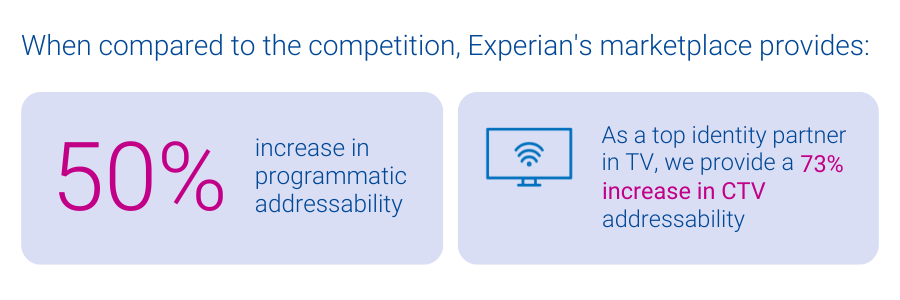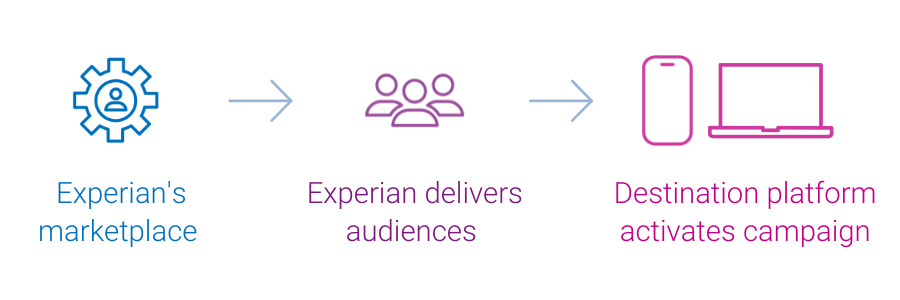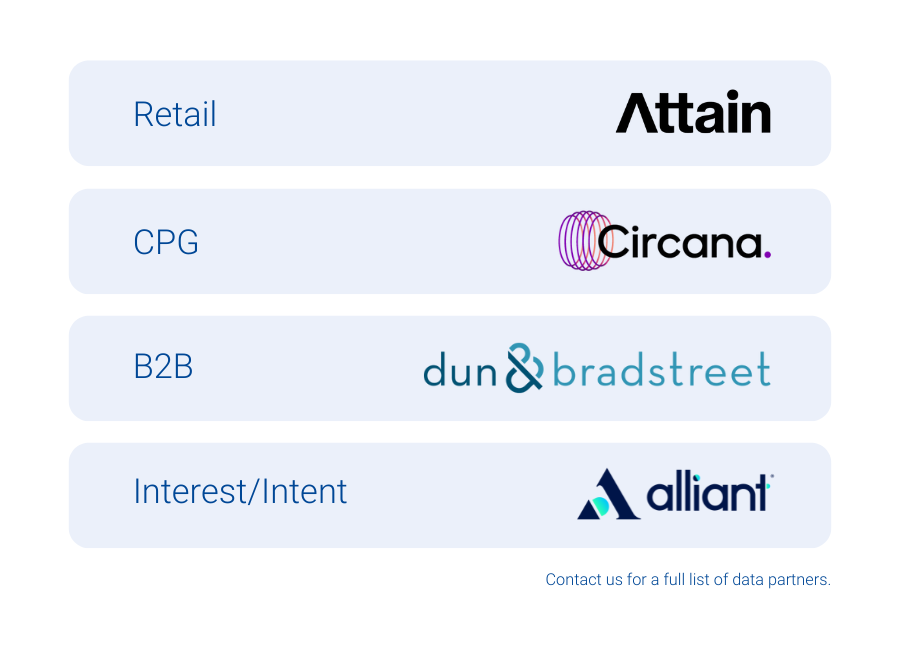
In a perfect world, we’d all have a single, go-to grocery store that carried everything on our shopping list – fresh produce, gourmet coffee beans, rare spices, and maybe even that special-grade olive oil, right alongside our wholesale bulk purchases at unbeatable prices. It would be convenient and efficient, and it’d save a lot of driving around town.
The changing data marketplace: From one-stop shop to specialized selection
For a long time, data buyers enjoyed something similar in their world: a small set of large-scale data marketplaces that offered a wide array of audiences, making it easy to load up on whatever you needed in one place. Not only are there fewer places to pick everything up, but new factors like privacy and signal deprecation are placing a spotlight on quality and addressability.
Just as our dinner plans are growing more ambitious insofar as we want health, flavor, value, and convenience all in one place – so are our data strategies. Instead of a single steak-and-potatoes meal, today’s data marketplace operators might be cooking up a complex menu of campaigns.
As a result, data buyers are beginning to shop around. Some still rely on large-scale marketplaces for familiar staples, but now they have reasons to explore other options. Some are turning to providers known for offering top-tier, transparently sourced segments. Others are focusing on specialty providers that excel in one area.
A more selective approach to data buying
In this environment, choosing where to “shop” for data is becoming more deliberate and selective. Data buyers aren’t just thinking about broad scale; they’re looking to prioritize quality, durability, data privacy, and differentiation. They need to place higher value on data marketplaces that can maintain audience addressability over time, despite signal loss. Sometimes, that means accepting a smaller assortment in exchange for tighter vetting and more reliable targeting. Other times it means mixing and matching – stopping by one marketplace for premium segments and another for cost-friendly, wide-reaching data sets. Either way, they can benefit from having more choices.
Experian’s marketplace: A trusted source for high-quality data
Experian’s vetted and curated blend of data partners and vertically-aligned audiences offers a trusted specialty store for data buyers. Experian’s marketplace, powered by identity graphs that include 126 million households, 250 million individuals, and 4 billion active digital IDs, enables partner audiences to be easily activated and maintain high addressability across display, mobile, and connected TV (CTV) channels. In particular, Experian’s marketplace provides:


The future of data marketplaces: Precision and flexibility matter
The evolution of data marketplaces reflects the industry’s shifting priorities. Data buyers seek specificity, reliability, and adaptability to align with their diverse campaign needs. The best data strategy, much like the best grocery run, isn’t about grabbing everything in one place – it’s about carefully selecting the right ingredients to create the perfect recipe for success. This shift underscores the importance of flexibility and precision as data buyers navigate a landscape shaped by privacy regulations, signal loss, and evolving consumer expectations.

As data marketplaces adapt to meet these demands, they are redefining what it means to deliver value. Experian’s marketplace enables buyers to strike the perfect balance between reach and quality by offering enhanced match rates, precise audience planning, and seamless distribution. In this new era, data buyers have the tools and options to craft campaigns that are impactful and aligned with the increasingly selective and privacy-conscious digital landscape. The key is recognizing that today’s data strategy is about utilizing the strengths of many to create a cohesive and effective whole.
If you’re interested in learning more about Experian’s marketplace or becoming an active buyer or seller in our marketplace, please contact us.
Contact us
Latest posts

Tapad, part of Experian, integrates with MediaJel's current advertising solutions will enable U.S. brands to benefit from improved cross-device reach and targeting capabilities NEW YORK, April 14, 2020 /PRNewswire/ — Tapad, part of Experian and a global leader in digital identity resolution, has partnered with MediaJel, a leading provider of advertising and marketing solutions for regulated markets. The partnership will enhance MediaJel's current offering, enabling brands to further improve their digital marketing campaigns, and thereby, return on investment. Tapad's global, privacy-safe digital cross-device solution, The Tapad Graph, will complement MediaJel's state-of-the-art advertising solutions to identify and resolve fragmentation created by a consumer's researching and purchasing behavior across multiple digital devices. For MediaJel, this provides customers with an opportunity for incremental efficiencies across a number of use-cases, including reach extension, targeting, ad frequency capping, suppression, and attribution. Dash Rothberg, Senior Vice President of Strategic Partnerships at MediaJel commented, "With an endless list of considerations across consumer behavior, marketing fragmentation, and today's ongoing device proliferation – optimizing digital campaigns can be challenging for most brand advertisers. We partnered with Tapad after testing multiple cross-device solutions in the market but concluded that The Tapad Graph provided us with a blend of scale, quality, flexibility, and privacy-safe data to meet our customer needs." Mike Dadlani, Vice President of Agency Partnerships at Tapad added: "Our partnership with MediaJel is an exciting one. Not only will their portfolio of clients be enabled to more effectively execute and optimize cross-device campaigns, but they will also realize longer-term benefits from improved attribution and consumer insights." To learn more about Tapad and our digital identity resolution capabilities, visit our identity page. About Tapad Tapad, Inc. is a global leader in digital identity resolution. The Tapad Graph and its related solutions provide a transparent, privacy-safe approach connecting brands to consumers through their devices globally. Tapad is recognized across the industry for its product innovation, workplace culture, and talent, and has earned numerous awards including One World Identity's 2019 Top 100 Influencers in Identity Award. Headquartered in New York, Tapad also has offices in Chicago, London, Oslo, Singapore, and Tokyo. About MediaJel Founded in 2017, MediaJel acts as a full-service agency that provides advertising and marketing solutions from brand building and search optimizations to campaign execution and online-offline attribution. Built with proprietary technology, the MediaJel.io platform leverages unique actionable data for brands and agencies to effectively execute high-performance marketing campaigns. With "Data Ethics" being the core of the business, all aspects are brand safe and compliant for regulated industries. Contact us today

Tapad's digital identity resolution offering enables Gimbal's platform to provide expanded insights for campaign optimization to U.S. brand and agency clients NEW YORK, Feb. 11, 2020 /PRNewswire/ – Tapad, part of Experian and a global leader in digital identity resolution, announced their partnership with Gimbal, a leader of location-powered marketing and advertising solutions. Gimbal now leverages Tapad's global, privacy-safe digital cross-device solution, The Tapad Graph, to further enhance its footfall attribution solution, Arrival. Arrival delivers dwell-based attribution for in-store foot traffic and by leveraging the Tapad Graph, Gimbal provides customers with a more holistic, attributable understanding of consumers across multiple devices, like desktop, smartphone, and tablet. With this, Gimbal's clients are enabled to make more informed media planning decisions for programmatic activations across the web, and mobile apps. "Today's consumers are utilizing their digital devices for research and comparison shopping before making a purchase. By leveraging The Tapad Graph, Gimbal's clients gain an even more complete view of the consumer decision journey across devices," said Chris Feo, SVP of Global Data Licensing and Strategic Partnerships at Tapad. "With the number of devices per individual rapidly increasing, understanding the customer decision journey is becoming more complex," said Kyle Wendling, SVP of Product at Gimbal. "We're excited to partner with Tapad to continue engaging consumers across multiple devices." To learn more about Tapad and our digital identity resolution products, visit our identity solutions page. About TapadTapad, Inc. is a global leader in digital identity resolution. The Tapad Graph, and its related solutions, provide a transparent, privacy-safe approach connecting brands to consumers through their devices globally. Tapad is recognized across the industry for its product innovation, workplace culture, and talent, and has earned numerous awards including One World Identity's 2019 Top 100 Influencers in Identity Award. Headquartered in New York, Tapad also has offices in Chicago, Denver, London, Oslo, Singapore, and Tokyo. About GimbalGimbal translates location data into intent, measurement, and insights to help organizations transform their businesses, maximize marketing relevance, and humanize messaging for consumers. Gimbal is headquartered in Los Angeles and provides advertising and marketing technologies to the world's leading brands and retailers interested in understanding the physical world. To learn more, visit https://gimbal.com. Contact us today

Tapad, part of Experian, integrates with AcuityAds' current offering will complement cross-channel capabilities for brands and agencies in the U.S. and Canada NEW YORK, Jan. 23, 2020 /PRNewswire/ — Tapad, a global leader in digital identity resolution, has partnered with AcuityAds, a technology leader that provides targeted digital media solutions for advertisers to connect intelligently with audiences. The partnership will enhance AcuityAds' existing cross-device solution, especially with respect to its cross-channel Connected TV offering. Tapad's global, privacy-safe digital cross-device solution, The Tapad Graph, will compliment AcuityAds' own cross-device data set for enhanced marketing capabilities across their Demand Side Platform (DSP). For AcuityAds, this provides customers with unduplicated reach across desktop, tablet, mobile and CTV devices – while augmenting their video offering. Tom Woods, Vice President of Products at AcuityAds commented, "With increasing marketing complexities, consumer device usage and new data regulations, our decision regarding the partnership was an important one. The Tapad Graph's privacy-safe identifiers for consumer notice and choice, as well as the ability to opt-out at any point, were critical factors in our decision who to partner with." Chris Feo, Senior Vice President, Strategy and Partnerships at Tapad added: "Our integration with AcuityAds' DSP should not only help marketers within North America optimize current cross-device campaign initiatives and performance, but also increase reach across additional digital screens long term. We are excited to expand our partnership with AcuityAds." To learn more about Tapad and our digital identity resolution capabilities, visit our identity page. About Tapad Tapad, Inc. is a global leader in digital identity resolution. The Tapad Graph and its related solutions provide a transparent, privacy-safe approach connecting brands to consumers through their devices globally. Tapad is recognized across the industry for its product innovation, workplace culture, and talent, and has earned numerous awards including One World Identity's 2019 Top 100 Influencers in Identity Award. Headquartered in New York, Tapad also has offices in Chicago, London, Oslo, Singapore, and Tokyo. About AcuityAds AcuityAds is a leading technology company that provides marketers a powerful and holistic solution for digital advertising across all ad formats and screens to amplify reach and Share of Attention® throughout the customer journey. Via its unique, data-driven insights, real-time analytics and industry-leading activation platform based on proprietary Artificial Intelligence technology, AcuityAds leverages an integrated ecosystem of partners for data, inventory, brand safety and fraud prevention, offering unparalleled, trusted solutions that the most demanding marketers require to be successful in the digital era. AcuityAds is headquartered in Toronto with offices throughout the U.S., Europe and Latin America. For more information, visit AcuityAds.com. Disclaimer in regards to Forward-looking Statements Certain statements included herein constitute "forward-looking statements" within the meaning of applicable securities laws. Forward-looking statements are necessarily based upon a number of estimates and assumptions that, while considered reasonable by management at this time, are inherently subject to significant business, economic and competitive uncertainties and contingencies. Investors are cautioned not to put undue reliance on forward-looking statements. Except as required by law, AcuityAds does not intend, and undertakes no obligation, to update any forward-looking statements to reflect, in particular, new information or future events. Contact us today